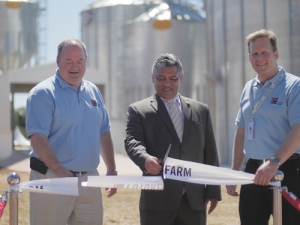AGCO and TAFE conclude commercial partnership with $260m share buyback
AGCO Corp has agreed with TAFE to resolve all outstanding disputes and matters related to their commercial relationship.
 From left, Tom Welke, senior vice president, global grain and protein, GSI; Given Lubinda, Agriculture and Livestock Minister, Zambia and Rob Smith, senior vice president, general manager Europe, Africa and Middle East at the official opening.
From left, Tom Welke, senior vice president, global grain and protein, GSI; Given Lubinda, Agriculture and Livestock Minister, Zambia and Rob Smith, senior vice president, general manager Europe, Africa and Middle East at the official opening.
AGCO, the manufacturer and distributor of MF, Fendt, Valtra and other brands, has opened its Future Farm and Learning Centre in Lusaka, Zambia.
Its aim is to support local and sustainable food production systems and increase farm outputs by using resources more efficiently.
The 150ha enterprise grows demonstration crops on land cultivated, planted and harvested by AGCO equipment. Local commercial and not-for-profit businesses lend their support.
As well as the farm’s mechanisation learning centre there will be grain and poultry learning centres, all three a first for Africa.
Around 200 people live in a community around the farm. The entity employs 40 workers, and up to 60 children are in gardening classes. The cropped area covers about 70ha and grows crops such as maize, hemp and sunflowers.
For AGCO at the recent opening, Rob Smith, senior vice-president and general manager for Europe, Africa and the Middle East commented “as Africa’s’ population is set to reach 2 billion by 2050 we saw that a need for sustainable mechanisation and training had never been greater. AGCO’s Future Farm will help small and medium scale farmers with basic agronomy, pre-harvest solutions and harvesting. For the larger farmers we will help with best practice techniques in protein production, grain storage and precision farming.”
AGCO sees Africa offering tremendous growth potential for business, and so will design products to suit the local environment, and manufacture locally also. It will also provide training and parts and service support from a Johannesburg base.
Nuradin Osman, director of operations, commented “what we are building here in Zambia is more than just bricks and mortar, it’s about people and partnerships. Mechanisation is the crucial ingredient in raising agricultural productivity in Africa, whilst the constraints of access to improved seeds and fertilisers are subduing the speed of progress. Both sides of the equation need attacking in parallel to enable the country to move forward.”
Fonterra’s impending exit from the Australian dairy industry is a major event but the story doesn’t change too much for farmers.
Expect greater collaboration between Massey University’s school of Agriculture and Environment and Ireland’s leading agriculture university, the University College of Dublin (UCD), in the future.
A partnership between Torere Macadamias Ltd and the Riddet Institute aims to unlock value from macadamia nuts while growing the next generation of Māori agribusiness researchers.
A new partnership between Dairy Women’s Network (DWN) and NZAgbiz aims to make evidence-based calf rearing practices accessible to all farm teams.
Despite some trying circumstances recently, the cherry season looks set to emerge on top of things.
Changed logos on shirts otherwise it will be business as usual when Fonterra’s consumer and related businesses are expected to change hands next month.
OPINION: Fonterra may be on the verge of selling its consumer business in New Zealand, but the co-operative is not…
OPINION: What does the birth rate in China have to do with stock trading? Just ask a2 Milk Company.